Advisory group
An advisory group has been formed to provide strategic and substantive guidance to the ongoing development of the Social Protection and Human Rights platform. Twelve distinguished experts have been appointed to in order to support this ambitious, interdisciplinary initiative. Through regular exchanges, the Advisory Group members below provide informed and judicious input to ensure that the project continues to support the implementation of a rights-based approach to social protection.
Do not hesitate to contact us if you would like to discuss anything with regards to the advisory group: unrisdsp_hr@un.org
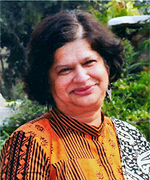
Maria Virgínia Brás Gomes
Senior Social Policy Advisor, General Directorate for Social Security and Member of the Committee on Economic, Social and Cultural Rights, Portugal
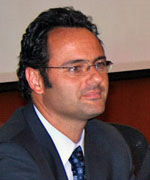
Simone Cecchini
Social Affairs Officer at United Nations Economic Commission for Latin America and the Caribbean (ECLAC), Chile
Simone Cecchini joined ECLAC in 2002, where he leads research and advises Latin American and Caribbean governments on the design and implementation of social protection policies and programmes, the human rights perspective to development and the assessment of conditional cash transfer programmes that aim to reduce poverty.
His research is characterized by a multi-disciplinary approach and a focus on equity and human rights. He has collaborated in the preparation of various institutional reports on development, poverty reduction and equity, such as Time for Equality: Closing Gaps, Opening Trails, the Social Panorama of Latin America, and The Millennium Development Goals (MDGs): a Latin American and Caribbean Perspective. He has also edited a series of publications called Social Protection Systems in Latin America and the Caribbean, which covers 21 countries in the region.
Simone worked at the World Bank’s Poverty Group from 1998 to 2002, where he analyzed developing nations’ socio-economic performance using quantitative and qualitative data, as well as performed evaluation and fieldwork on uses of information and communications technologies for poverty reduction in rural India.
Selected publications:
- (with F. Filgueira and C. Robles) Social protection systems in Latin America and the Caribbean: a comparative view, ECLAC Social Policy Series No. 202, November 2014
- (with F. Veras Soares) Conditional cash transfers and health in Latin America, The Lancet Series on “Universal health coverage in Latin America”, The Lancet, October 2014
- (eds. with M. Lavigne), Public policies for equality: Towards universal social protection systems, ECLAC Seminars and Conferences Series No. 78, July 2014
- (with R. Martínez), Inclusive Social Protection in Latin America. A Comprehensive, Rights-based Approach, ECLAC Book 111, January 2012.
- (with A. Madariaga), Conditional Cash Transfer Programmes. The Recent Experience in Latin America and the Caribbean, ECLAC, Cuaderno No. 95, September 2011
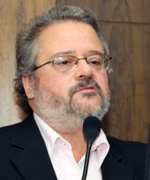
Armando De Negri Filho
Epidemiologist and Coordinator of the Executive Committee of the World Social Forum on Health and Social Security, Brazil
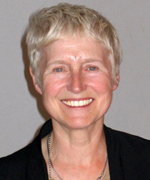
Diane Elson
Emeritus Professor of Sociology at the University of Essex, United Kingdom
Diane Elson has collaborated with UNRISD over a number of years. In 2012, she wrote a chapter entitled Social Reproduction in the Global Crisis: Rapid Recovery or Long-Lasting Depletion? in the UNRISD/Palgrave volume The Global Crisis and Transformative Social Change.
Previously, she was part of the research team for the project Gender Justice, Development and Rights (2000-2002), for which she wrote a paper Social Policy and Macroeconomic Performance: Integrating the Economic and the Social. Elson is a member of the UN Committee for Development Policy and Emeritus Professor of Sociology at the University of Essex, UK. Previously, she worked for the United Nations Development Fund for Women (UNIFEM) and for Manchester University where she was Professor of Development Studies.
Her research interests are in global social change and the realisation of human rights with a particular focus on gender inequality. A chapter on her work is included in Fifty Key Thinkers on Development (edited by D. Simon, and published by Routledge in 2006). She edited Male Bias in the Development Process (1995); co-edited Special Issues of World Development on Gender, Adjustment and Macroeconomics (1995); Growth, Trade, Finance and Gender Inequality (2000) and the UNIFEM Report on Progress of the World’s Women (2000).
Her recent publications related to human rights include:
- (ed. with R. Balakrishnan) Economic Policy and Human Rights Obligations, Zed Press, London, 2012
- (ed. with S. Fukuda-Parr and P. Vizard) Human Rights and the Capabilities Approach. An Interdisciplinary Dialogue, Routledge, London, 2012.
- (with R. Balakrishnan and J. Heintz), ‘Public Finance, Maximum Available Resources and Human Rights’ in C.Harvey, A.Nolan and R. O’Connell ( eds) Human Rights and Public Finance: Budget Analysis and the Advancement of Economic and Social Rights, Hart Publishing, Oxford, 2013.
- (with H. Reed and S. Himmelweit, ‘An Adequate Standard of Living: A Child Rights Based Quantitative Analysis of Budgetary Decisions 2010-13’, Office of the Children’s Commissioner, London, 2013.

Jane Hodges
Collaborating Researcher and Senior Research Associate
Jane Hodges has collaborated with UNRISD over a number of years. In November 2012, Jane participated in the Gender-Related Research within the UN System, a joint UN Women – UNRISD workshop.
She is an International Human Rights Consultant based in Geneva, Switzerland. Until 2014 she was the Director of the Gender, Equality and Diversity Branch of the International Labour Organization, and since 2008 headed the ILO’s Bureau for Gender Equality within the ILO’s Senior Management Team. She currently edits the “International Labour Law Reports” (Brill/Nijhoff Publishers).
True to her human rights scholarship and training, since joining the ILO in 1979 Ms. Hodges served in the Freedom of Association and Equality & Human Rights Coordination Branches, the Southern African Multidisciplinary Team (based in Harare), the Department for Government, Labour Law and Administration, and the Department of Social Dialogue, Labour Law and Labour Administration, where she led the Labour Law Reform team.
She has broad experience in international and comparative human rights law, with the specialization of international labour law, and has designed and delivered training programmes in the area of fundamental principles and rights at work, in particular gender equality, human rights and HIV/AIDS. She has represented the ILO in many UN bodies during her career, in particular advocating international labour standards on non-discrimination with the treaty bodies and in the functional commissions and Human Rights Council. Her research into the impact of international labour standards in the delivery of justice had led Ms Hodges to work with judges from across a range of jurisdictions. Ms Hodges is the author of a number of articles and has contributed to books concerning workers’ rights as human rights.
Prior to joining the ILO, Jane practised law as a solicitor, notary public and trademarks Attorney, at the Sydney headquarters of an international law firm.
Selected publications:
- “The role of the International Labour Organisation in balancing work and family in the 21st century”, Journal of Industrial Relations, Vol. 56 No. 4 (Sydney, 2014).
- ILERA: “Gender issues in 21st Century Industrial Relations – the case for pay equity and ILO Convention No 100”, paper delivered at the 16th ILERA World Congress (Philadelphia, July 2012).
- “Digest of good legislative practices relating to HIV/AIDS in selected African countries”, DIALOGUE Working Paper No. 12, Nov. 2007.
- “Promoting & defending economic, social & cultural rights: a Handbook”, Ed. A. McChesney, American Association for the Advancement of Science (Washington DC, 2000).
- “Affirmative action in the employment of ethnic minorities and persons with disabilities”, Co-author Carl Raskin (ILO, Geneva, 1997).
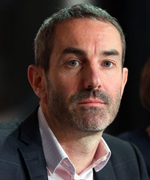
Ignacio Saiz
Executive Director of the Centre for Economic and Social Rights, USA
Ignacio Saiz is Executive Director of the Center for Economic and Social Rights (CESR), an international NGO that works to advance human rights in the sphere of socio-economic and development policy. As part of its work to promote alternatives to fiscal austerity and a new sustainable development paradigm beyond 2015, CESR has advocated for universal social protection floors as a means to ensure the fulfillment of governments’ core economic and social rights obligations. Ignacio has formerly served as Director of Policy at Amnesty International, where he oversaw the organization’s first program on economic, social and cultural rights, and as Deputy Director of Amnesty’s Americas Program, with responsibility for the organization’s work in Mexico and Central America. Ignacio holds an LLM in international human rights law with distinction from the University of Essex.
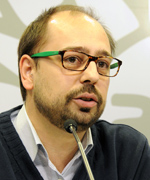
Andrés Scagliola
LGBT Rights and Public Policy Coordinator, Social Development Department of the Intendencia de Montevido, Uruguay
Andrés Scagliola is a political scientist with postgraduate degrees from the Universidad de la República (Montevideo) and Universitat Autònoma (Barcelona). From 2010-2015, Andrés was the Social Policies National Director for the Social Development Ministry of Uruguay, as well as the Coordinator of the Social Policies National Council. He is also currently a member of the Working Group on Social, Economic and Cultural Human Rights Progress Indicators of the Organization of American States (San Salvador Protocol). As a human rights activist and public policy expert, he is specialised in social inclusion and care for children, elderly people, people with disabilities, LGBT people, people of African descent and people living with HIV.Relevant publications for the Social Policies National Council are available in Spanish here: http://issuu.com/dnpsmides.
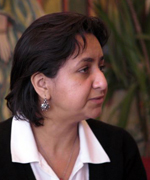
Hania Sholkamy
Associate Professor at the Social Research Centre, American University in Cairo, Egypt

Timo Voipio
Director for Implementing Strategy and Partnerships for the EU Social Protection Systems (EU-SPS) Programme, THL, Finland
Timo Voipio is the Director for Implementing Strategy and Partnerships for the EU Social Protection Systems (EU-SPS) Programme, which is part of the Government of Finland’s National Institute for Health and Welfare (THL). Previously, he served as the Senior Adviser for Social Policy and Decent Work at the Finnish Ministry of Foreign Affairs. He is an experienced and renowned expert and mediator in several global networks promoting universal social and economic rights through global and national social policy, social protection, decent work, disability and social development. Dr. Voipio has country-level work experience in participatory rural development, social protection, disability and media work in several countries in Africa and Asia. He is active in practitioner and scholar networks in the United Nations, European Union, African Union, OECD, World Bank, ILO and global CSOs. He has also worked for the ILO in Geneva as research manager of the International Social Security Association (ISSA). He chaired the OECD Poverty Network (POVNET) and its Task Team on Social Protection, and currently he is closely engaged in a new EU programme supporting the building up of national social protection systems with national think tanks and expert institutions of low and lower middle income countries. His academic background is in economic and social history, social policy, environmental economics, adult education and journalism.Voipio has collaborated with UNRISD on several occasions. In February 2013, he chaired an UNRISD side event on New Directions in Social Policy, held during the 51st session of the Commission for Social Development in New York. Earlier collaborations included participation at a SIDA/SAREC workshop on Social Policy and Equality in 2006.
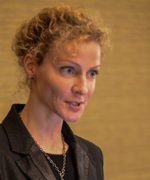
Alicia Ely Yamin
Lecturer on Global Health and Policy Director at François-Xavier Bagnoud Center for Health and Human Rights, Harvard University, USA


